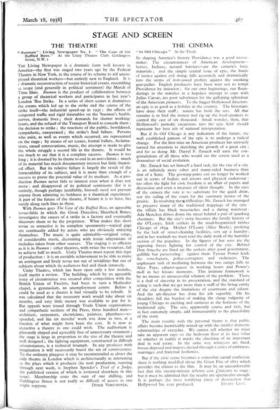STAGE AND SCREEN
THE THEATRE
61 Busmen" : Living Newspaper No. 1. " The Case of the Baffled Boss." At the Unity Theatre Club, Goldington Street, N.W. I
THE Living Newspaper is a dramatic form well known in America—the first was staged two years ago by the Federal Theatre in New York, in the course of its scheme to aid unem- ployed theatrical workers—but entirely new to England. It is t. dramatic reconstruction of recent historical events, resembling m scope (and generally in political sentiment) the March of Time films. Busmen is the product of collaboration between a group of theatrical workers and participants in last year's London 'Bus Strike. In a series of short scenes it dramatises the events which led up to the strike and the course of the strike itself—the industrial speed-up in 1931 ; the effects of congested traffic and rigid timetables on the 'busmen's health, nerves, domestic lives ; their demands for shorter working- hours, and the refusal of the Transport Board to concede them ; the decision to strike ; the reactions of the public, bewildered, sympathetic, exasperated ; the strike's final failure. Persons who exist, as well as events which occurred, are represented on the stage ; by means of set scenes, formal ballets, declama- tions, casual conversations, music, the attempt is made to give the whole struggle a second life in the theatre. It would be too much to say that it is a complete success. Busmen is too long ; it is doomed by its theme to end in an anti-climax ; much of its material has much documentary interest but little theatri- cal effect. But its relative failure is largely the result of the intractability of its subject, and it is more than enough of a success to prove the potential value of its medium. As a pro- duction Busmen never fails to interest even when it does not move : and disapproval of its political sentiments (for it is entirely, though perhaps justifiably, biassed) need not prevent anyone from admiring its boldness as a theatrical experiment. A part of the future of the theatre, if future it is to have, lies surely along such lines as these.
With Busmen goes The Case of the Baffled Boss, an agreeable revue-fable in which the Great Detective, Sheerluck Bones, investigates the causes of a strike in a factory and eventually discovers them to be the proprietor. What makes this short revue so attractive is its complete spontaneity—topical gags are continually added by actors who are obviously enjoying themselves. The music is quite admirable—original songs, of considerable merit, alternating with ironic adaptations of melodies taken from other sources. The staging is as efficient as it is in Busmen : other theatres, with twice the resources, fail to achieve half so much. Unity Theatre must repeat this type of production : it is an enviable achievement to be able to make an astringent and lively revue not out of trivialities but out of subjects about which its audiences feel and think intensely.
Unity Theatre, which has been open only a few months, itself merits a review. The building, which by an agreeable irony of circumstance was secured after competition with the British Union of Fascists, had been in turn a Methodist chapel, a gymnasium, an unemployment centre. Before it could be used as a theatre it had virtually to be rebuilt. It was calculated that the necessary work would take about six months, and very little money was available to pay for it. But appeals were issued through Trade Union organisations and sympathetic sections of the Press, three hundred men— architects, carpenters, electricians, painters, plumbers—re- sponded, and the six months' work was done in two, at a fraction of what might have been the cost. It is now as attractive a theatre as one could wish. The auditorium is pleasantly shaped and agreeably free of unnecessary ornament ; the stage is large in proportion to the size of the theatre and well designed ; the lighting equipment, constructed in difficult circumstances, is a technical triumph. In any producer with imagination it will necessarily breed the sin of covetousness. To the ordinary playgoer it may be recommended as about the only theatre in London which is architecturally as interesting as the plays which it produces (its next production, running through next week, is Stephen Spender's Trial of a Judge, the published version of which is reviewed elsewhere in this Issue). Membership costs the sum of one shilling, and Goldington Street is not really so difficult of access as one














































 Previous page
Previous page